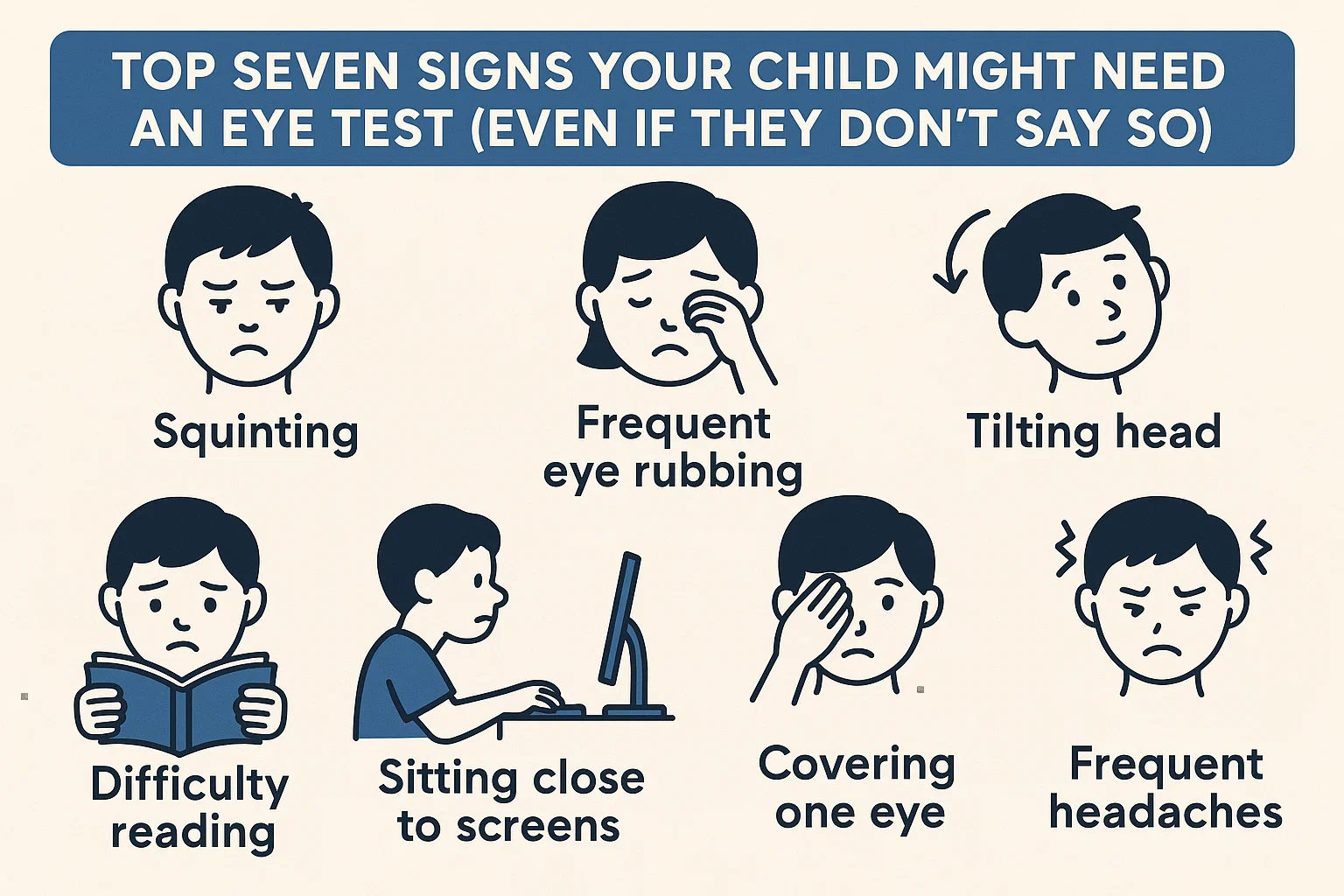Top seven signs your child might need an eye test (even if they don’t say so)

Most children experience vision problems without even realising anything is wrong. Children often struggle to put into words hazy vision or tired eyes. They tend to accept what they see as normal. This is why parents must be especially observant for less obvious signals that something is affecting their child’s eyes. A children’s eye test in Melbourne will definitely help uncover issues that can affect school performance, growth, and confidence if not addressed.
They constantly tend to rub their eyes
Eye rubbing can be a very normal habit, especially in young children. However, when this behaviour happens even when your child is not tired, it can be a sign of visual distress. Untreated vision issues often lead children to rub their eyes trying to clear their vision. It is also perhaps their normal reaction to stress from trying to see things or letters that are out of focus. The repeated, frequent rubbing can eventually lead to irritation or redness. While parents will first consider allergies, if there are no signs of that, it is a good idea to question whether your child is struggling with an undiagnosed vision problem.
They avoid activities that require detailed vision
If your child stops taking an interest in activities such as reading, colouring, puzzles, or TV viewing from a regular distance, parents will often attribute it to distraction or boredom. But avoidance of such activities might be a subtle symptom of visual struggle. Kids won’t necessarily describe letters as fuzzy or pictures as unclear — they simply quit doing the things that tax their vision.
They tend to tilt their head or close an eye
Most kids involuntarily tilt their heads or close an eye while watching television or reading a book. Even if the act is one of playfulness or inquiry, the action may imply a highly severe visual imbalance. The child might be struggling with an issue in one eye and is compensating in this way in the hope of balancing and clarifying. Closing one eye may imply amblyopia, also known as a lazy eye, where one eye takes over and the other does not. The earlier this is detected, the higher the possibility of getting it corrected. Eye problems such as these have long-term effects if left undetected, and parents should therefore never take this lightly.
They frequently complain of headaches or eye pain after school
Does your child frequently complain of headaches? If so, the pain in the forehead or brow area may indicate poor vision. Eye strain can build up during a school day while studying books, computer screens or even chalkboards. Others experience sore eyes, facial pressure, or even fatigue after classes. The signs are easily confused with fatigue or dehydration. However, after reading and screen time, once it becomes routine, it is definitely worth checking if your child’s eyes are straining from undiagnosed vision issues. A simple eye test can reveal a great deal about the child and their learning environment.
They sit very close to screens or hold books too near
Some children sit so close to TVs, tablets, or phones that it is alarming. Though this may appear odd behaviour, it is a good indicator of nearsightedness or shortsightedness. Kids do this so they can see well up close without realising this isn’t typical. In class, a child with this problem may be unable to see the whiteboard or hear directions from across the classroom. An on-time eye check can resolve this issue with a simple prescription for glasses or other corrective measures.
They tend to trip, bump into objects, or appear clumsy
Stubborn clumsiness isn’t necessarily just a case of “normal” child behaviour. Your child may bump into things or objects. You will notice that your child has trouble seeing things at the extreme periphery (sides of the visual field). In addition to causing minor cuts and bruises, these problems also affect a child’s ability to play sports and perform tasks in tight spaces such as schoolyards. If this happens often, it may be worth questioning whether vision is a factor.
They have difficulty focusing or keeping up in school
Vision is vital for learning. If a child is constantly squinting when reading, is unable to see the board or can’t seem to keep up with activities that require sight, they may be labelled as inattentive or distractible. But their inattention may not be a focus issue — it may simply be a matter of poor vision. Recognising a vision problem early on can mean all the difference in school success and self-confidence.
Vision issues in children do not always present themselves in obvious ways. Children adapt, compensate, or remain silent only because they expect everyone to see the same as they do. Rubbing eyes, reading or watching things close up on screens, not wanting to read books, or stumbling frequently may all be silent clues of a larger problem. It’s never too early to get your child’s eyes checked by experienced optometrists in Melbourne. Regular appointments are an easy and certain way to ensure your child’s eyes remain clear, their self-esteem high, and learning experience carefree.



